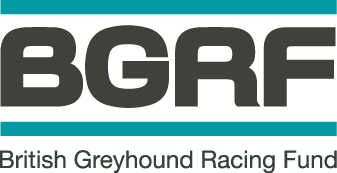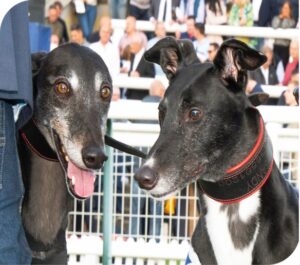FAQ
Frequently asked questions
More about the BGRF
The BGRF was set up in 1992 to collect voluntary contributions from bookmakers based on off-course greyhound betting turnover and uses the funds arising for the enhancement of the sport of greyhound racing as licensed by the Greyhound Board of Great Britain (GBGB).
The BGRF provides a forum for discussion between the sport and betting sectors furthering good relations and understanding. We recognise there is a common interest in improving all aspects of licensed greyhound racing.
There are fourteen seats on the BGRF board appointed by the members. The members are the GBGB (7 seats); the Betting and Gaming Council (BGC) (3 seats); Scottish Independent Bookmakers’ Association (SIBA) (1 seat); National Association of Bookmakers (NAB) (1 seat); One independent bookmaker seat; plus the independent chairman of the board.
BGRF Income
Bookmakers make voluntary contributions to the BGRF based on 0.6% of turnover on greyhound racing. Smaller bookmakers may elect to pay at a rate of 0.6% based on taking 12.8% as the average shop turnover for greyhounds (Gambling Commission).
For matched or exchange betting, the rate of payment is calculated as a percentage of GGR (Gross Gaming Revenue) from the sportsbook and applied as a percentage of the commission earned on greyhound racing at UK tracks from UK customers. In 2019 the BGRF secured a deal ensuring support from the major online companies in future.
A full list of our current contributors appears here.
We list those major bookmakers supplying a voluntary audit certificate. We encourage all bookmakers to supply certificates but these can be costly for the smaller operator to produce and this is entirely voluntary. As part of the new deal with online operators, all the major companies will be providing audit certificates. More information here.
There is no legislative requirement for a Statutory Levy, as there is for horse racing. The BGRF was set up in 1992 as a voluntary mechanism and that is how it remains. We continue to engage with non-payers and we use the services of a special consultant to help us with this. The GBGB is charged with political representation and this includes examining the possibility of other methods of payment.
If you are new to the BGRF please take a look at our Bookmakers section which shows you how to join our supporters.
Budgeting
Each autumn we estimate how much income will be available in the following year and invite the Greyhound Board of Great Britain to make a budget recommendation. The GBGB and BGRF represent diverse stakeholders across the sport and are best placed to make recommendations on expenditure. The BGRF board meets in December to agree a final budget for the following year and this is published in the sector press.
The BGRF has to satisfy the needs of its diverse stakeholders when agreeing an annual budget. Welfare and integrity have always been our priority and as the funds available have reduced in recent years the BGRF has ring-fenced provisions to ensure that essential services can continue.
For the past few years grants to stadia have been offered exclusively for welfare-related projects and to encourage welfare investment we now offer support at a rate of up to 75% of net costs, with a maximum of £10,000 per stadium per annum. A list of grants awarded last year appears here.
No. The BGRF makes a grant award to the GBGB for certain budget items and some funding for trainers is available through them, subject to their current grant criteria. Trainers are advised to make enquiries to their Stipendiary Steward, contact us here, or email grants@gbgb.org.uk. Greyhound owners are supported through BGRF prize money contributions to graded racing including the popular Owners’ Bonus Series.
In September 2020 the GBGB launched its ground-breaking Greyhound Retirement Scheme. You may qualify to take part in this, so please contact the GBGB directly.
Stadia grants
The BGRF agrees a budget each year on the advice of the GBGB who represent the industry stakeholders. Within that budget, a sum will be reserved for Capital Grants to Stadia. Grants to stadia constitute about 1% of our current budget.
Promoters submit a formal written application using the BGRF Grant Policy Guidelines. The Guidelines state clearly what will or will not be funded and give strict submission requirements: for example, the promoter cannot make a claim for own labour on a project. The applicant also has to state whether the project includes work undertaken by any Related Party. These are just examples.
The grant application is then considered either by the BGRF board committee or the full BGRF board, depending on which meeting follows the application. If a grant is awarded, a legal document is sent to the applicant setting out our binding terms & conditions.
The BGRF does not have any contract with suppliers in relation to projects undertaken by the stadia. When a promoter applies for grant funding they submit third-party tenders or quotations from their chosen suppliers. The BGRF requires a minimum of two quotations for minor works and a minimum of three tenders for major works.
For minor works, it is in the interest of the promoter to ensure that he or she seeks value for money because the BGRF never awards grants of more than 75% of net value. The BGRF cannot independently seek quotations for projects in which it has no direct involvement.
No, the BGRF has no direct dealings with any supplier and cannot offer advice on supplier choice.
The BGRF never awards more than 75% of net project value with a current cap of £10,000 per stadium per annum.
The BGRF has a one-year rule which means that no grant funding is available for capital projects or prize money during the first year of operation. This ensures that new businesses are viable before we make an investment. However, we do offer welfare and integrity support from the start so that the racing greyhound is protected.
At the end of the first year the new stadium will qualify for the full range of benefits available to all stadia on an equal basis.
Grants to stadia are restricted to a range of welfare-related projects. Each year we set a budget and the stadia have to make formal grant applications which are then considered on merit. Currently there is a cap of £10,000 per stadium per annum. There is no grant entitlement and applications have to conform to strict criteria and policies.
When the BGRF awards a grant to a stadium we have to enter a Profit & Loss commitment in our accounts in line with normal accounting standards.
However, the stadium does not receive any payment of funds until the works have been carried out and paid for by them. Sometimes projects don’t go ahead and in those circumstances the grant is written back so that the funds are available for others to apply for. This is then recorded in the accounts.
BGRF grants are depreciated over a term of five years. After the term is up items such as tractors can be disposed of without our permission. Most tractors will last many years before a replacement is needed but because of the use of salt on tracks, and the action of sand on the mechanism, parts can corrode more quickly than in, say, agricultural use.
All BGRF grants are subject to a legal agreement with the recipient that stipulates a term of depreciation over five years. If the stadium closes then any net book value from prior year grants must be repaid to the BGRF. We have always enforced this condition in the past and will continue to do so.
Yes, we have full documentation for prior year grants for monitoring and accounting purposes.
Welfare support helps cover the costs of providing a veterinary surgeon at the meetings, as required by GBGB regulations. Integrity support helps to cover the costs of paddock security. Both of these are essential to racing and are awarded to all stadia on an equal basis. Funds are limited and we can only contribute up to a maximum of three meetings per week.
Public scrutiny
Yes, the BGRF is independently audited each year by Haysmacintyre LLP, an accountancy firm specialising in not-for-profit and sporting bodies. We publish our accounts usually three months after the year end which is on 31st March. The GBGB has separate independent auditors.
Fact: the BGRF is defined as a small company and so is exempt from the legal requirement to be audited. However, since we were set up in 1992 we have been audited each and every year as part of our commitment to transparency and public accountability.
Our website contains a pdf version of the BGRF accounts for the past three years and these are free to download here.
Our year end is March 31st and the accounts are approved by the board in June. We publish our latest report & accounts in late summer or early autumn each year, click here to download this year's report.
The BGRF benefits from a wide range of expertise on its board and this does include stadia promoters. Any director with a connection has to declare an interest and is not present when the grant request is considered by the BGRF board. Such declarations are minuted and the grants associated with directors who are related parties are published in our Report & Accounts each year for public scrutiny. In addition each director must make a declaration to the BGRF of wider financial interest in accordance with current legislation.
The director in question has to make a declaration of interest as a related party and leave the room. This is then minuted.
The Fund board is unusual in that directors are nominated by its Members rather than the directors themselves. The BGRF Members are the Greyhound Board of Great Britain (7 seats); the Betting and Gaming Council (3 seats); the National Association of Bookmakers (1 seat); the Scottish Independent Bookmakers’ Association (1 seat); one independent bookmaker seat, plus the independent board Chairman, making a total of 14 directors with occasional vacancies, as listed here.
According to the BGRF Articles of Association a director can serve for three years after which he or she must either step down or be re-nominated by the company’s member organisations. All our directors are subject to re-nomination on a three-year rolling basis and so roughly one third fall due for consideration each year.
If you have evidence of a crime being committed you should inform the police. If you have no evidence but have a substantial concern, then please send us the full details by email in the first instance. Please note that we will be obliged to refer your allegation to the GBGB for formal investigation under their disciplinary procedures.



